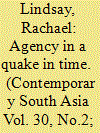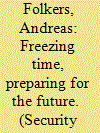|
|
|
Sort Order |
|
|
|
Items / Page
|
|
|
|
|
|
|
| Srl | Item |
| 1 |
ID:
185091


|
|
|
|
|
| Summary/Abstract |
This article explores agency through humour and time amongst a group of Pakistani young men who reside, or recently resided, in a refugee shelter for unaccompanied minors in Athens, Greece. It asks how their jokes about alternate futures might challenge the slow, structural violence which places these young men on the margins of society in terms of work, space, and temporality. Despite a lack of anthropological work on humour, particularly amongst migrant communities, this article takes up humour as an analytical tool due to its pervasive presence in the shelter and its challenge to the discourse of victimhood of migrant children. I ultimately argue that conventional theories about the role of humour fail to fully account for the temporalities that these jokes around futurity evoke. This article also sheds light on the various constructs of time at play within the lives of these young men and how these are disrupted in the moment of the joke. It asks what modalities of agency emerge during these jokes when we employ Deleuze’s non-linear syntheses of time and seeks, ultimately, to look beyond conventional assumptions of youth agency and structural inequality, and to question the premises upon which such conventions are built.
|
|
|
|
|
|
|
|
|
|
|
|
|
|
|
|
| 2 |
ID:
170758


|
|
|
|
|
| Summary/Abstract |
This article analyses stockpiling as a security device that hoards time, stores power and buffers disruptions. The stockpile is a temporal matter of security by virtue of its ability to freeze time and to prepare for future emergencies. Stockpiling is informed by anticipations of threats but also materially underpins expectations. After unpacking the temporal ontology of stockpiling, the article traces its history as a security device and technology of power. Stockpiling enabled the emergence of the earliest states by establishing the means to store surpluses and centralize power. In modernity, stores became more dispersed as money, commodity exchange and new infrastructures made it possible to procure resources through circulation. In the 20th century, stockpiling became a reflexive security device reactive to risks associated with the disruption of these circulations. Finally, the article illuminates the role of reserves in contemporary German catastrophe preparedness to show that stockpiling remains an important security technique. Yet fiscal austerity and budgetary constraints limit security stockpiling. To compensate for the absence of public security stores, the government is prompting citizens to establish emergency stockpiles. The article offers a theoretical, historical and empirical engagement with stockpiling and thereby further elucidates the material politics of anticipation.
|
|
|
|
|
|
|
|
|
|
|
|
|
|
|
|
| 3 |
ID:
147204


|
|
|
|
|
| Summary/Abstract |
Building on recent analyses of futurity, I argue that the Pakistani poet Faiz Ahmed Faiz's communist affiliation created new routes of movement, new threats of confinement, and at different moments, produced significantly different visions of the future. Part one unearths the ‘grammar of futurity’ in Faiz's prison verses (1951–54), which I compare with those of the Chilean poet, Pablo Neruda. Part two examines Faiz's travelogue of his 1973 visit to Cuba, which reveals his aspirations for Pakistan's future. Faiz's enduring political and cultural utility, I conclude, is bound up with the ambiguous nature of futurity offered in his writing.
|
|
|
|
|
|
|
|
|
|
|
|
|
|
|
|
|
|
|
|
|